Florida Bans Internet Cafes in Wake of Gambling Scandal

TALLAHASSEE, Fla. (Associated Press) — Florida legislators voted overwhelmingly Thursday to ban storefront gaming operations, a quick response to a scandal that led to dozens of arrests and the lieutenant governor's resignation.
The bill is now headed to the desk of Gov. Rick Scott, who said he will sign it. The operations, commonly called "Internet cafes," would allow customers to play sweepstakes games that simulated slot machines.
"It took a serious event, a very serious event, to bring attention to what we needed to do," said Sen. John Thrasher, R-St. Augustine and one of the sponsors of the measure.
The Florida Senate approved the measure on a 36-4 vote Thursday. The Florida House had already approved it.
The Legislature is feeling pressure to act after an investigation into the Allied Veterans of the World charity. It was accused of running a $290 million illegal gambling business that directed most of the proceeds into its owners' pockets. Law enforcement authorities last month arrested nearly 60 people affiliated with Allied.
Former Lt. Gov. Jennifer Carroll, who had done consulting work for the charity when she was still a member of the Legislature, resigned after she was interviewed as part of that same investigation. She has not been accused of any wrongdoing.
A handful of legislators opposed the bill because they said it went too far and would also result in the closure of senior arcades.
Sen. Miguel Dias de la Portilla, R-Miami, said legislators were responding to what he called "mass hysteria" surrounding that investigation.
"This broad net is going to affect a lot of innocent people," said Diaz de la Portilla, who still wound up voting for the bill.
But Thrasher said lawmakers were making sure that "unscrupulous operators" were not taking advantage of loopholes in order to carry out illegal gambling.
The storefront operations started sprouting around the state within the last six years amid debates over their legality. The game makers argued they were legal sweepstakes because there's a predetermined number of winners, similar to a McDonald's Monopoly game or Coca-Cola's cap contest. Unlike slot machines run at casinos, the operations were not heavily regulated.
Authorities said the "Internet cafe" was set up like this: Customers buy Internet or phone time on a card and can check email and surf the Web on any number of computers. But instead of doing that, customers play games such as "Captain Cash" and "Lucky Shamrocks" and players are encouraged to spend more to win more, investigators said.
Florida allows slot machines in casinos run by the Seminole Tribe of Florida and at dog and horse tracks in South Florida. The bill being sent to Scott makes it clear that machines that simulate slot machines or other casino type games are illegal elsewhere in the state.
The legislation also puts limits on sweepstakes and states that arcades cannot award gift cards or cash to its winners. It also states that arcades are supposed to be operating coin-operated games that involve an element of skill not casino-styled games.
Senior arcades rely on the gift cards and their operators have said that the measure would most likely put them out of business.
Gale Fontaine, president of an association that represents senior arcades, said she was "disappointed and disheartened" by the vote and predicted it would not only harm adult amusement centers but could also impact arcades run by chains like Chuck E. Cheese.
"Seniors and children are being punished despite following the rules and providing a safe place for entertainment," Fontaine said in a statement. "It's highly disappointing to see the Legislature punish our seniors for the misdeed of Internet cafe operators."
That point of view was echoed by some like Sen. Maria Sachs, D-Delray Beach, who pointed out that authorities have never targeted senior arcades.
But supporters of the legislation said lawmakers were shrugging off years of inaction despite the mushrooming of the internet cafes across the state. Bills to ban the storefront operations had been pushed the last three years but it took the scandal involving Allied to suddenly give the effort momentum.
Sen. Bill Galvano, R-Bradenton, said that legislators were clarifying what had been gray areas in the the state's gambling law that had not kept pace with new technology.













